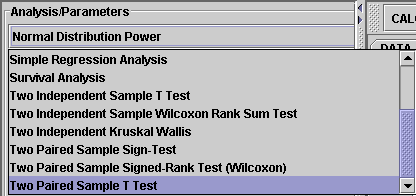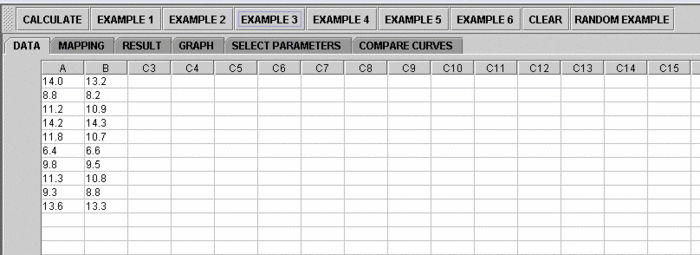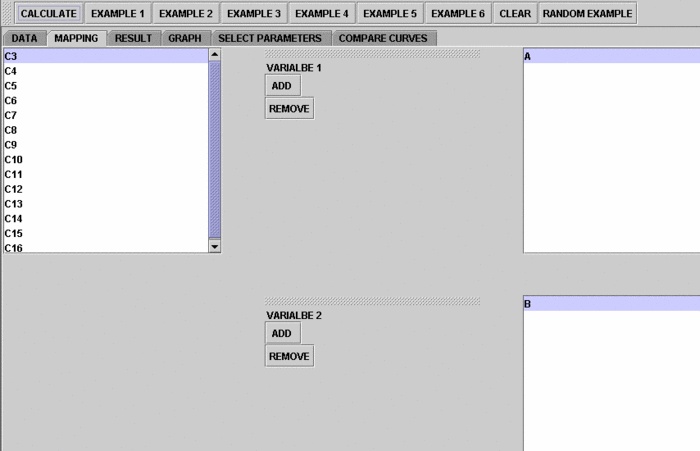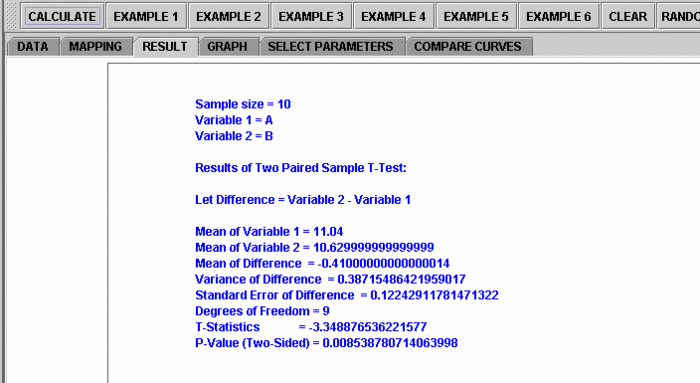SOCR EduMaterials AnalysisActivities TwoPairedT
From Socr
(→Two Paired Sample T-Test Example) |
|||
| Line 1: | Line 1: | ||
| - | ==Two Paired Sample T-Test Example== | + | ==[[SOCR_EduMaterials_AnalysesActivities | SOCR Analysis]] - Two Paired Sample T-Test Example== |
| - | This is a test for the hypothesis that two groups are with the same mean, while the data are | + | |
| + | This is a test for the hypothesis that two groups are with the same mean, while the data are actually paired. That is, Each value of group 1 has a corresponding value in group 2. | ||
==Two Paired Sample T-Test Example== | ==Two Paired Sample T-Test Example== | ||
| - | We will demonstrate Two Paired T-Test with a SOCR built-in example. This example is based on a dataset from the statistical program "R." For more information of the R program, please see [http://cran.r-project.org/ CRAN Home Page]. The dataset used here is "'''shoes'''" under R's "'''MASS"''' library. In the dataset, ten boys are given to the wear of shoes of materials A and B for one foot. We'd like to find if one material is better than the other. | + | |
| + | Go to the [http://www.socr.ucla.edu/htmls/ana/TwoPairedSampleTTest_Analysis.html SOCR Two Paired Sample T-Test Applet]. We will demonstrate Two Paired T-Test with a SOCR built-in example. This example is based on a dataset from the statistical program "R." For more information of the R program, please see [http://cran.r-project.org/ CRAN Home Page]. The dataset used here is "'''shoes'''" under R's "'''MASS"''' library. In the dataset, ten boys are given to the wear of shoes of materials A and B for one foot. We'd like to find if one material is better than the other. | ||
| Line 20: | Line 22: | ||
| - | '''2.''' Click on the "'''Mapping'''" button to get to the "'''Mapping'''" panel. Click on '''"ADD"''' under '''VARIABLE 1''' to add '''A''' and click on '''ADD''' under '''VARIABLE 2''' to add '''B'''. We care about the difference, so which on goes to '''VARIABLE 1''' or '''VARIABLE 2''' is arbitrary. Here, the computer will set difference = Variable 2 - Variable 1. If you like the | + | '''2.''' Click on the "'''Mapping'''" button to get to the "'''Mapping'''" panel. Click on '''"ADD"''' under '''VARIABLE 1''' to add '''A''' and click on '''ADD''' under '''VARIABLE 2''' to add '''B'''. We care about the difference, so which on goes to '''VARIABLE 1''' or '''VARIABLE 2''' is arbitrary. Here, the computer will set difference = Variable 2 - Variable 1. If you like the subtraction to go the other way around, simple assign '''VARIABLE 1''' and '''VARIABLE 2''' in the opposite way. |
| Line 33: | Line 35: | ||
'''Questions for students:''' By looking at the test results, what do you think about the data? What can you say about the two different shoe materials? | '''Questions for students:''' By looking at the test results, what do you think about the data? What can you say about the two different shoe materials? | ||
| - | |||
| - | |||
Revision as of 19:50, 23 January 2009
SOCR Analysis - Two Paired Sample T-Test Example
This is a test for the hypothesis that two groups are with the same mean, while the data are actually paired. That is, Each value of group 1 has a corresponding value in group 2.
Two Paired Sample T-Test Example
Go to the SOCR Two Paired Sample T-Test Applet. We will demonstrate Two Paired T-Test with a SOCR built-in example. This example is based on a dataset from the statistical program "R." For more information of the R program, please see CRAN Home Page. The dataset used here is "shoes" under R's "MASS" library. In the dataset, ten boys are given to the wear of shoes of materials A and B for one foot. We'd like to find if one material is better than the other.
Here's the steps of the activity:
1. Click on Two Paired Sample T-Test at the left panel's combo box.


On the right panel, first click on EXAMPLE 3 and next click on "Data" to retreive the demonstrated example. This is the example we'll be looking at.Note that the data are difference of B - A.

2. Click on the "Mapping" button to get to the "Mapping" panel. Click on "ADD" under VARIABLE 1 to add A and click on ADD under VARIABLE 2 to add B. We care about the difference, so which on goes to VARIABLE 1 or VARIABLE 2 is arbitrary. Here, the computer will set difference = Variable 2 - Variable 1. If you like the subtraction to go the other way around, simple assign VARIABLE 1 and VARIABLE 2 in the opposite way.

3. Click on "Calculate" then "Result" to see the results.

Questions for students: By looking at the test results, what do you think about the data? What can you say about the two different shoe materials?
Translate this page:
